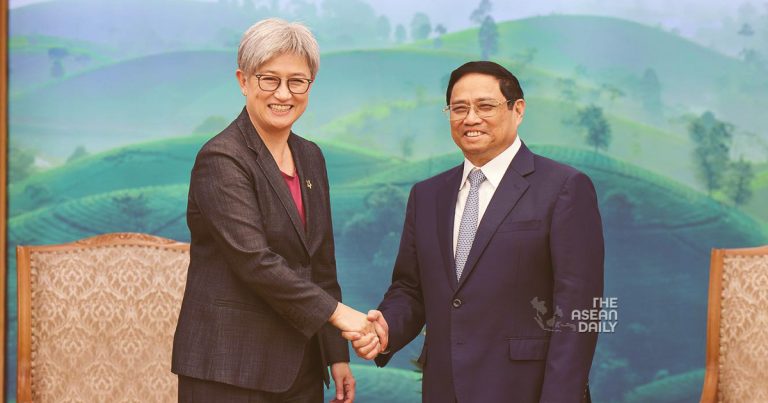24-8-2023 (HANOI) Australian Foreign Minister Penny Wong has announced an enhancement of official relations between Australia and Vietnam, citing a shared commitment to a global order that protects nations “regardless of size or power.”
In a speech delivered at a college in Ho Chi Minh City, Wong highlighted the increasing closeness between Hanoi and Canberra, noting that the world is undergoing significant transformations driven by challenges like geopolitics and climate change, which she also identified as a substantial business opportunity.
Both Vietnam and Australia have faced strategic challenges, particularly from China. Vietnam is embroiled in territorial disputes with China in the South China Sea, while Australia faced trade restrictions from Beijing after calling for an investigation into the origins of the COVID-19 pandemic.
Wong emphasized that neither Vietnam nor Australia are global superpowers but share a desire for prosperity and global engagement, free from undue influence by larger nations. She stated, “The way to see the comprehensive strategic partnership … is to see it as a statement of shared vision, shared purpose.”
During her visit to Vietnam, Wong discussed expanding cooperation in various sectors, including digital services, security, trade, and climate change.
Wong’s visit to Vietnam came shortly after Australia’s announcement that it would acquire 1,500-kilometer-range Tomahawk missiles, positioning itself as the third country, alongside the United States and the United Kingdom, to possess these missiles. This move is widely seen as a response to China’s growing influence in the Indo-Pacific region.
While Wong did not provide a specific timeline for the bilateral upgrade of relations, she acknowledged that Vietnam and Australia both face a common challenge: coal consumption. Despite being a leading coal exporter, Australia is committed to achieving net-zero carbon emissions through clean energy, a transition that Wong argued should be leveraged for economic gain.
Wong encouraged students to capitalize on the opportunities presented by the shift towards clean energy, stating, “If we want to make, to be frank, make money in that world for our country and for ourselves, we’re going to have to be able to provide goods and services that are given greater value in a world where we want to hit net-zero by 2050.”
Australia’s commitment to strengthening its relationship with Vietnam aligns with broader diplomatic efforts in the region. U.S. President Joe Biden has expressed his intention to visit Vietnam soon to elevate bilateral relations. Several nations, including Japan, the United Kingdom, and Australia, are commemorating 50 years of diplomatic ties with Vietnam this year, while the United States and Vietnam mark a decade as comprehensive partners.
Wong’s visit also reflects the historical connection between Australia and Vietnam, with Australia having supported the United States during the Vietnam War, followed by the establishment of diplomatic ties with Hanoi in 1973. This history has led to a significant Vietnamese community in Australia, making Vietnamese the fourth most commonly spoken language in the country according to the 2021 census.
Penny Wong, who was born in Malaysia, shared her personal experience of growing up in Australia during the 1970s, where she encountered racial discrimination as the nation opened its doors to Vietnamese and other Asian immigrants. She went on to become Australia’s first foreign-born foreign minister and the first openly gay woman in national politics, highlighting the nation’s evolving multicultural landscape.




